2015-2016学年人教版必修1 Unit 2 English around the world Warming up and reading 课件(共34张PPT)
文档属性
| 名称 | 2015-2016学年人教版必修1 Unit 2 English around the world Warming up and reading 课件(共34张PPT) |  | |
| 格式 | zip | ||
| 文件大小 | 925.0KB | ||
| 资源类型 | 教案 | ||
| 版本资源 | 人教版(新课程标准) | ||
| 科目 | 英语 | ||
| 更新时间 | 2015-12-01 11:55:04 | ||
图片预览

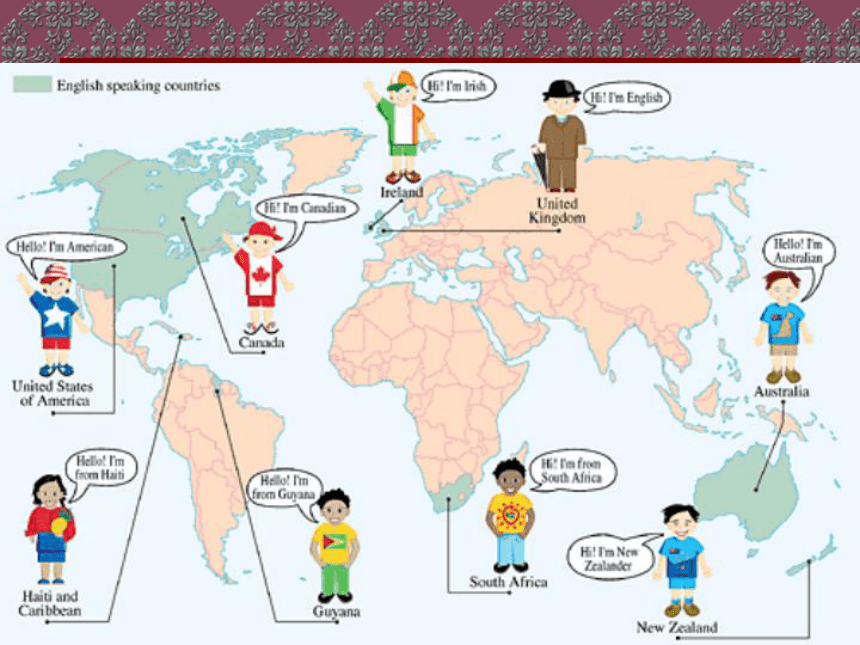

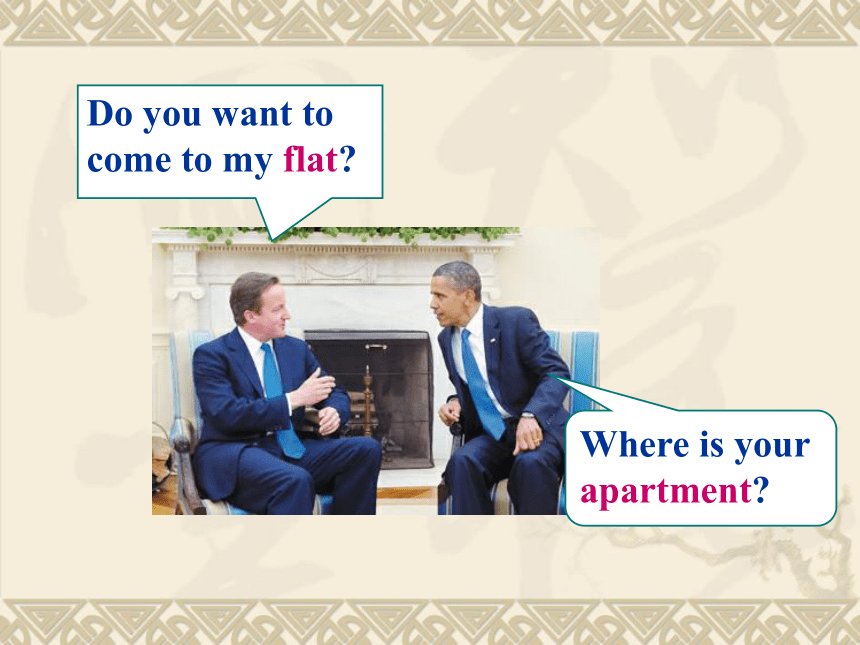
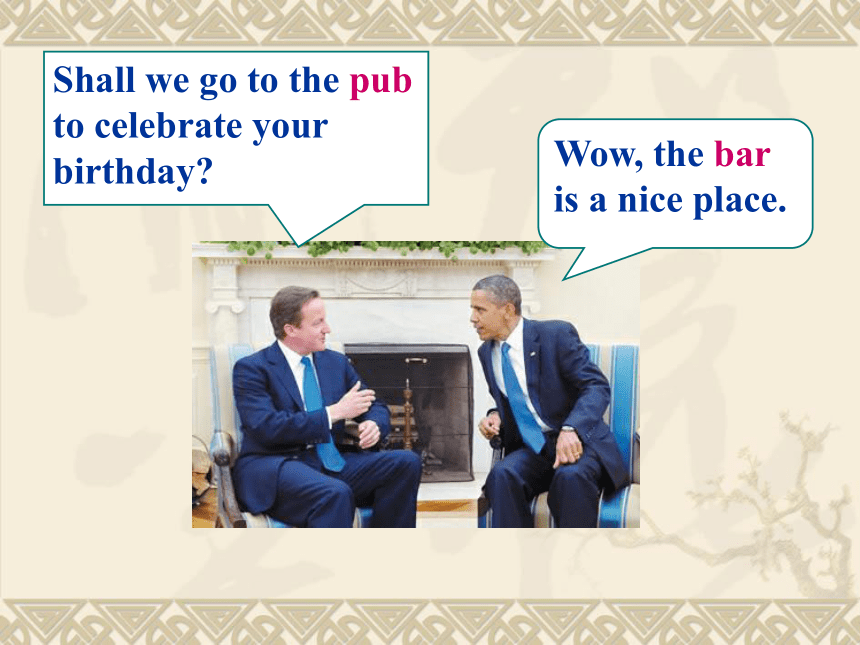
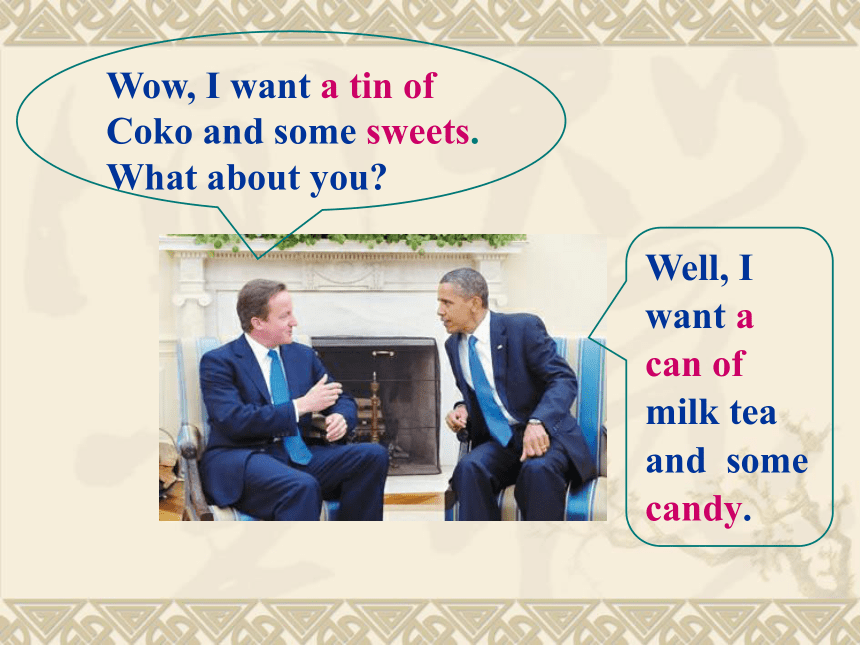
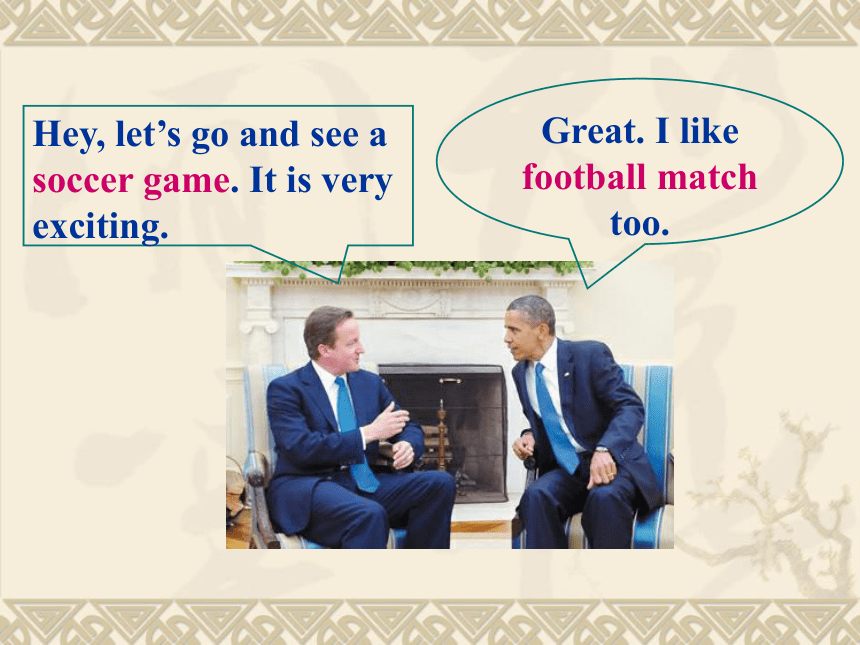
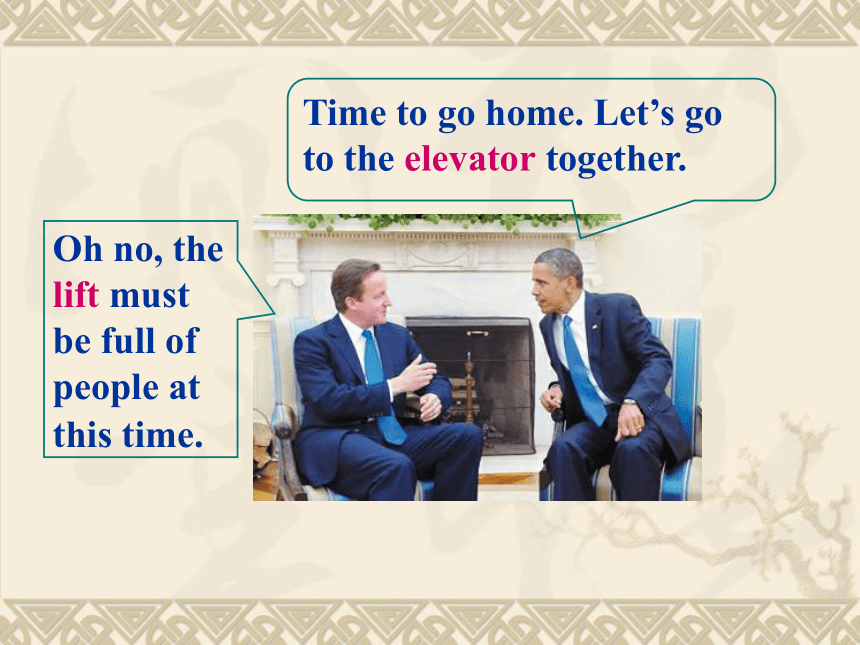
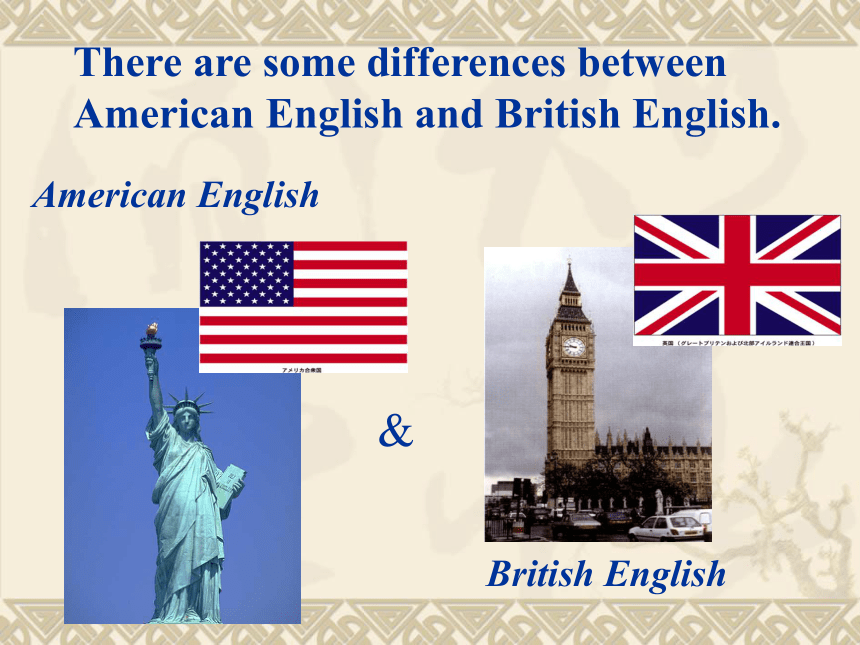
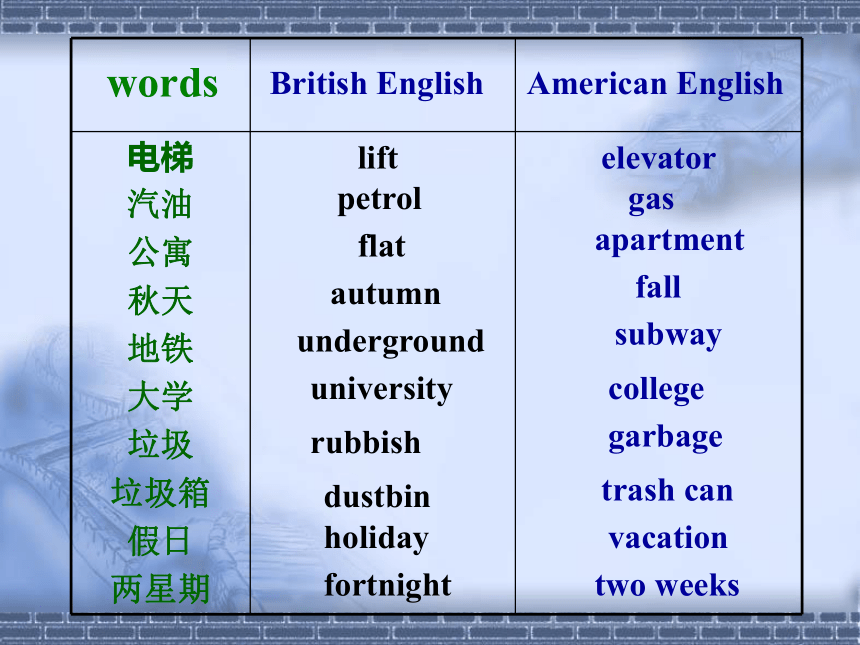
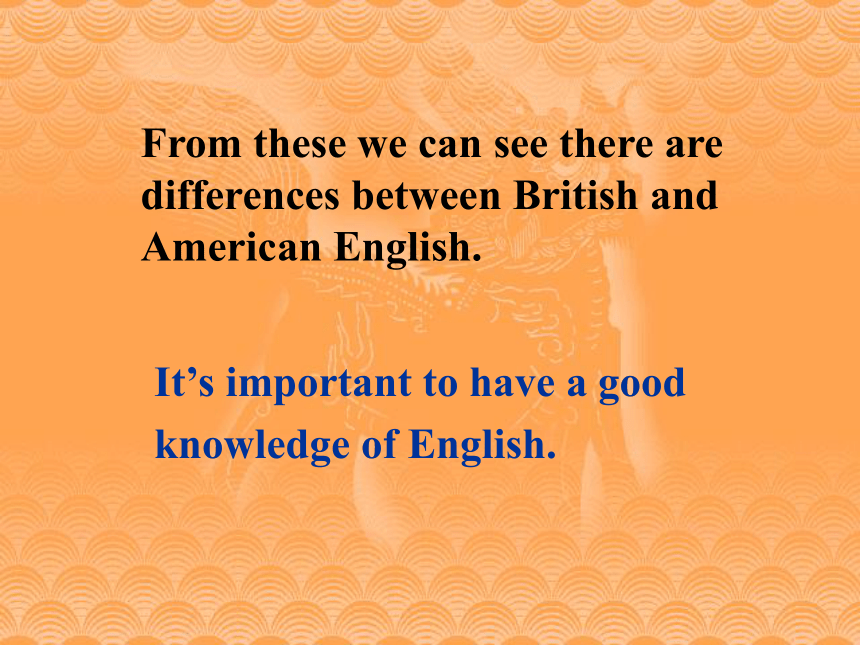
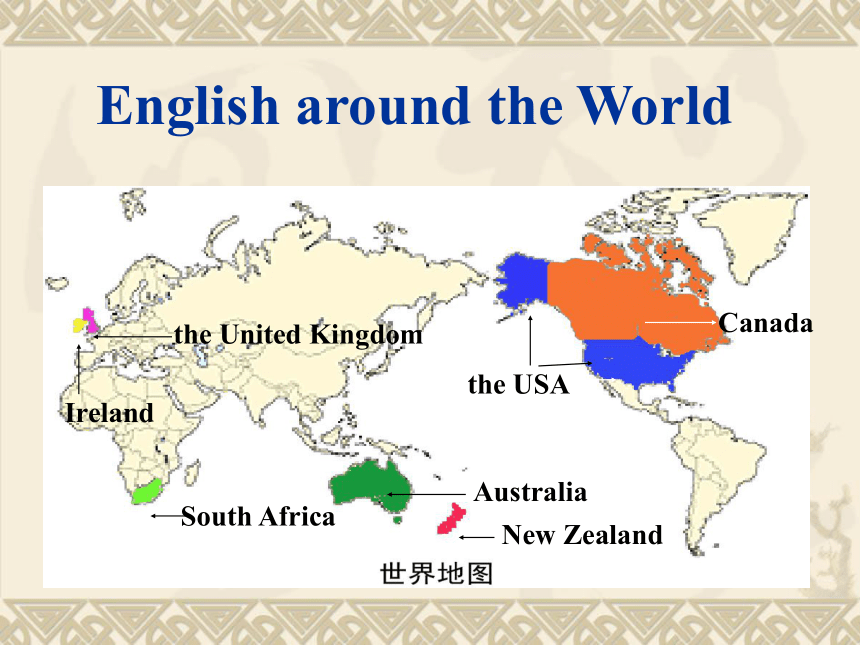
文档简介
课件34张PPT。 第一节 Warming up and readingEnglish around
the world 高一英语Book 1 Unit 2Let’s read a dialogue between Obama
and Cameron.Do you want to come to my flat?Where is your apartment?Shall we go to the pub to celebrate your birthday?Wow, the bar
is a nice place.Wow, I want a tin of Coko and some sweets. What about you?Well, I want a
can of
milk tea and some
candy.
Great. I like football match too.Hey, let’s go and see a soccer game. It is very exciting.Oh no, the lift must be full of people at this time. Time to go home. Let’s go to the elevator together.British EnglishAmerican English&There are some differences between American English and British English.British EnglishAmerican Englishwordslift elevatorpetrol gasflatapartmentautumnfallundergroundsubwayuniversitycollegerubbishgarbagedustbintrash canholidayvacationfortnighttwo weeksIt’s important to have a good
knowledge of English.From these we can see there are differences between British and American English.English around the Worldthe USACanadaNew ZealandAustraliaSouth Africathe United KingdomIreland Do you know how many people use English as their native language, second language, or foreign language?375 million750 million375 millionUSA, Canada, Australia, South Africa, Ireland, New ZealandChina and many other countriesIndia, Pakistan, Nigeria, Philippines.government, schools, newspapers, TV Do you think the English spoken all around the world are all the same?
American English British
English Australian English
Canadian English
Singapore English
African English Malaysian English Indian EnglishAs we all know, English is widely used in many fields while Chinese is spoken by the largest number of speakers. Do you think Chinese will become an international language all over the world in the near future? Give your reasons. Discussion1. Which country do you think has the most English learners?
2. Look at the title of the text and guess what it is about. Then read it quickly.Fast-readingAnswer the questions
When did English begin to be spoken in many other countries?
Finish the task 1 in comprehending.
Detailed-readingRead and find the main idea of each paragraph.(in 5 minutes)Para 1 The history of English spreading all over the world.
Para 2 Native language speakers can understand each other even if they don’t speak the same kind of English.
Para 3-4 All language change when cultures communicate with each other.
Para 5 English is spoken as a foreign language or second language in Africa and Asia.
1. English has/had the most speakers ___.
A. now
B. when the British ruled many parts of
the world
C. in the time of Shakespeare
D. in the 12th centuryAChoose the correct answer.2. Which of the following statements is
true?
A. Languages always stay the same.
B. Languages change only after wars.
C. Languages no longer change.
D. Languages change when cultures
change.D3. From AD 450 to 1150, English
sounded more like _____.
A. French
B. Chinese
C. German
D. RussianC4. Shakespeare’s English was spoken
around the ____.
A. 1400’s
B. 1150’s
C. 450’s
D. 1600’sD5. Which country has the fastest
growing number of English
speakers in the world?
A. Australia
B. China
C. India
D. BritainBAt the end of the 16th century, about seven million people spoke English. Nearly all of them lived in ________. As people from England started ______ to other parts of the world, English began to be ______ in many other countries. Now more people speak English than ever_______. ________English speakers can understand each other even ___they don’t speak ____same kind of English. _________, they may not be able to understand everything. EnglandmovingspokenbeforeNativeiftheHoweverRead aloud and fill in the blanks.All languages change when ________ communicate with each other. Now American English and Australian English have their own_______. English is also spoken in many other countries in Africa and______, such ____ South Africa, India, Singapore and Malaysia. Today the number of the people in China ___ increasing _______. In future Chinese English will become one of the world Englishes.culturesidentityAsiaas is rapidly通向现代英语之路
16世纪末期,大约有五百万到七百万人说英语,几乎所有这些人都生活在英国。后来,在17世纪英国人开始航海(voyage)征服(conquer)了世界的其他地区。于是(because of因为),许多别的国家开始说英语了。如今说英语的人比以往任何时候都多,他们有的是作为第一语言来说,有的是作为第二语言或外语。以英语作为母语的(native本地的)人,即使他们所讲的语言不尽相同,也可以互相交流。请看以下例子:
英国人贝蒂:“请到我的公寓里来看看,好吗?”
美国人艾米:“好的。我很乐意到(come up走近;上来)你的公寓(apartment)去。”那么,英语在一段时间里为什么会起变化呢?事实上(actually),当不同文化互相交流渗透时,所有的语言都会有所发展、有所变化。首先,在公元(AD)450年到1150年间,人们所说的英语跟今天(at present现在;目前)所说的英语就很不一样。当时的英语更多地是以德语为基础(base)的,而现代英语不是。然后,渐渐地(gradually),大约在公元800年到1150年期间,英语不那么像德语了,因为那时的英国的统治者起初讲丹麦语(Danish)后来讲法语。这些新的定居者大大丰富(enrich)了英语语言,特别是在词汇(vocabulary)方面。所以到17世纪,莎士比亚(Shakespeare)所用(make use of使用)的词汇量比以前任何时期都大。在1620年,一些英国人搬迁到美洲定居。后来,到了18世纪,有些英国人也被送往澳大利亚。两个国家的人都开始说英语了。最后,到19世纪,英语才真正定型。那时,英语在拼写(spelling)上发生了两大变化:首先塞缪尔·约翰逊(Samuel Johnson)编写了词典,后来,诺厄·韦伯斯特(Noah Webster)编纂了《美国英语词典》。后者(latter)体现了美国英语拼写的不同特色(identity本身;身份)。现在,英语在南亚也被当做外语或第二语言。比如说,印度拥有众多讲英语很流利的(fluent)人,这是因为英国于1765年到1947年统治过印度。在那期间,英语成了官方语言和教育用语。在新加坡(Singapore)、马来西亚(Malaysia)和非洲其他国家,比如(such as)南非,人们也说英语。目前在中国学习英语的人数正在迅速增长,事实上,中国可能拥有世界上最多的英语学习者。中国英语会发展出自己的特色吗?这只能由时间来回答了。
the world 高一英语Book 1 Unit 2Let’s read a dialogue between Obama
and Cameron.Do you want to come to my flat?Where is your apartment?Shall we go to the pub to celebrate your birthday?Wow, the bar
is a nice place.Wow, I want a tin of Coko and some sweets. What about you?Well, I want a
can of
milk tea and some
candy.
Great. I like football match too.Hey, let’s go and see a soccer game. It is very exciting.Oh no, the lift must be full of people at this time. Time to go home. Let’s go to the elevator together.British EnglishAmerican English&There are some differences between American English and British English.British EnglishAmerican Englishwordslift elevatorpetrol gasflatapartmentautumnfallundergroundsubwayuniversitycollegerubbishgarbagedustbintrash canholidayvacationfortnighttwo weeksIt’s important to have a good
knowledge of English.From these we can see there are differences between British and American English.English around the Worldthe USACanadaNew ZealandAustraliaSouth Africathe United KingdomIreland Do you know how many people use English as their native language, second language, or foreign language?375 million750 million375 millionUSA, Canada, Australia, South Africa, Ireland, New ZealandChina and many other countriesIndia, Pakistan, Nigeria, Philippines.government, schools, newspapers, TV Do you think the English spoken all around the world are all the same?
American English British
English Australian English
Canadian English
Singapore English
African English Malaysian English Indian EnglishAs we all know, English is widely used in many fields while Chinese is spoken by the largest number of speakers. Do you think Chinese will become an international language all over the world in the near future? Give your reasons. Discussion1. Which country do you think has the most English learners?
2. Look at the title of the text and guess what it is about. Then read it quickly.Fast-readingAnswer the questions
When did English begin to be spoken in many other countries?
Finish the task 1 in comprehending.
Detailed-readingRead and find the main idea of each paragraph.(in 5 minutes)Para 1 The history of English spreading all over the world.
Para 2 Native language speakers can understand each other even if they don’t speak the same kind of English.
Para 3-4 All language change when cultures communicate with each other.
Para 5 English is spoken as a foreign language or second language in Africa and Asia.
1. English has/had the most speakers ___.
A. now
B. when the British ruled many parts of
the world
C. in the time of Shakespeare
D. in the 12th centuryAChoose the correct answer.2. Which of the following statements is
true?
A. Languages always stay the same.
B. Languages change only after wars.
C. Languages no longer change.
D. Languages change when cultures
change.D3. From AD 450 to 1150, English
sounded more like _____.
A. French
B. Chinese
C. German
D. RussianC4. Shakespeare’s English was spoken
around the ____.
A. 1400’s
B. 1150’s
C. 450’s
D. 1600’sD5. Which country has the fastest
growing number of English
speakers in the world?
A. Australia
B. China
C. India
D. BritainBAt the end of the 16th century, about seven million people spoke English. Nearly all of them lived in ________. As people from England started ______ to other parts of the world, English began to be ______ in many other countries. Now more people speak English than ever_______. ________English speakers can understand each other even ___they don’t speak ____same kind of English. _________, they may not be able to understand everything. EnglandmovingspokenbeforeNativeiftheHoweverRead aloud and fill in the blanks.All languages change when ________ communicate with each other. Now American English and Australian English have their own_______. English is also spoken in many other countries in Africa and______, such ____ South Africa, India, Singapore and Malaysia. Today the number of the people in China ___ increasing _______. In future Chinese English will become one of the world Englishes.culturesidentityAsiaas is rapidly通向现代英语之路
16世纪末期,大约有五百万到七百万人说英语,几乎所有这些人都生活在英国。后来,在17世纪英国人开始航海(voyage)征服(conquer)了世界的其他地区。于是(because of因为),许多别的国家开始说英语了。如今说英语的人比以往任何时候都多,他们有的是作为第一语言来说,有的是作为第二语言或外语。以英语作为母语的(native本地的)人,即使他们所讲的语言不尽相同,也可以互相交流。请看以下例子:
英国人贝蒂:“请到我的公寓里来看看,好吗?”
美国人艾米:“好的。我很乐意到(come up走近;上来)你的公寓(apartment)去。”那么,英语在一段时间里为什么会起变化呢?事实上(actually),当不同文化互相交流渗透时,所有的语言都会有所发展、有所变化。首先,在公元(AD)450年到1150年间,人们所说的英语跟今天(at present现在;目前)所说的英语就很不一样。当时的英语更多地是以德语为基础(base)的,而现代英语不是。然后,渐渐地(gradually),大约在公元800年到1150年期间,英语不那么像德语了,因为那时的英国的统治者起初讲丹麦语(Danish)后来讲法语。这些新的定居者大大丰富(enrich)了英语语言,特别是在词汇(vocabulary)方面。所以到17世纪,莎士比亚(Shakespeare)所用(make use of使用)的词汇量比以前任何时期都大。在1620年,一些英国人搬迁到美洲定居。后来,到了18世纪,有些英国人也被送往澳大利亚。两个国家的人都开始说英语了。最后,到19世纪,英语才真正定型。那时,英语在拼写(spelling)上发生了两大变化:首先塞缪尔·约翰逊(Samuel Johnson)编写了词典,后来,诺厄·韦伯斯特(Noah Webster)编纂了《美国英语词典》。后者(latter)体现了美国英语拼写的不同特色(identity本身;身份)。现在,英语在南亚也被当做外语或第二语言。比如说,印度拥有众多讲英语很流利的(fluent)人,这是因为英国于1765年到1947年统治过印度。在那期间,英语成了官方语言和教育用语。在新加坡(Singapore)、马来西亚(Malaysia)和非洲其他国家,比如(such as)南非,人们也说英语。目前在中国学习英语的人数正在迅速增长,事实上,中国可能拥有世界上最多的英语学习者。中国英语会发展出自己的特色吗?这只能由时间来回答了。
